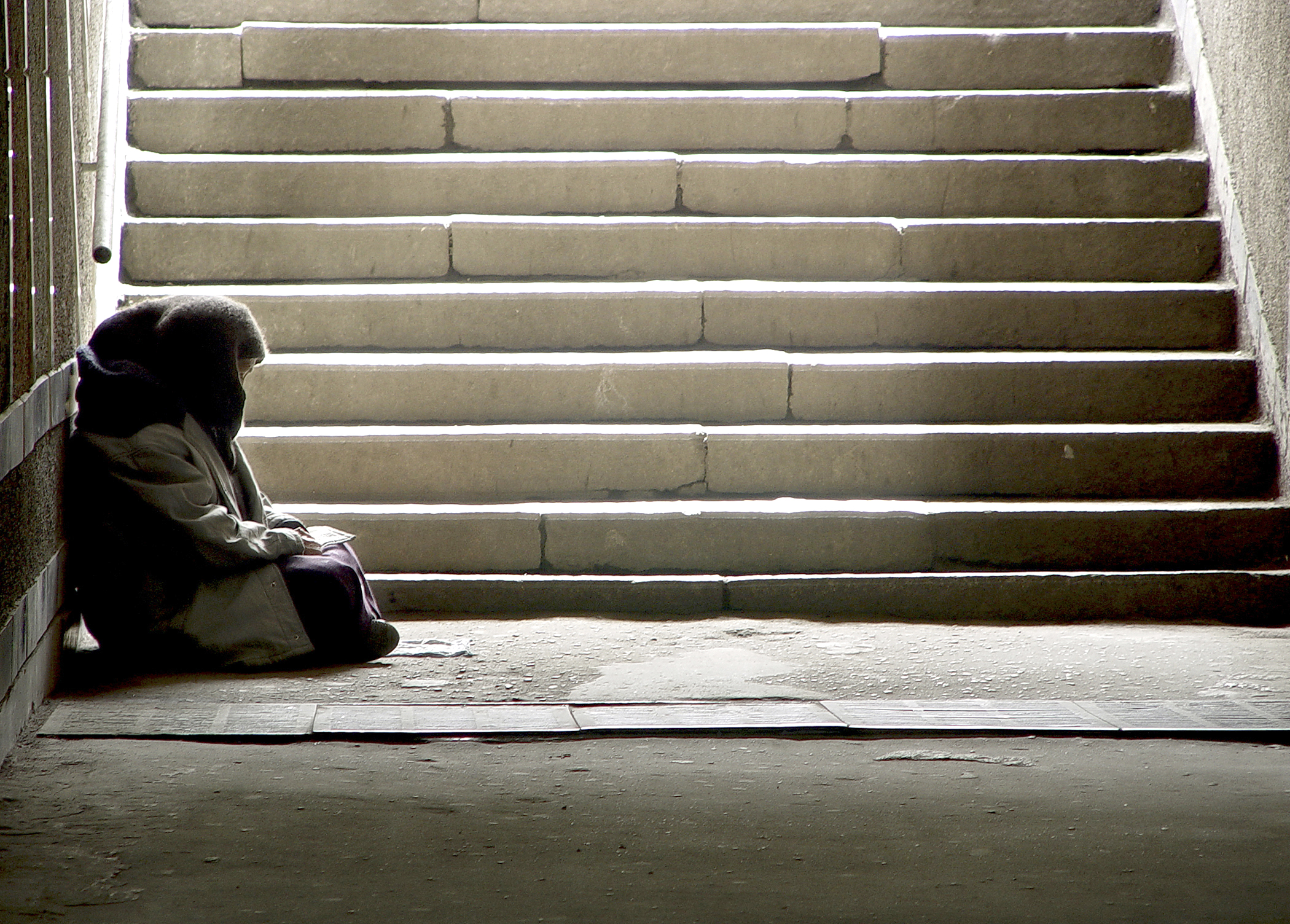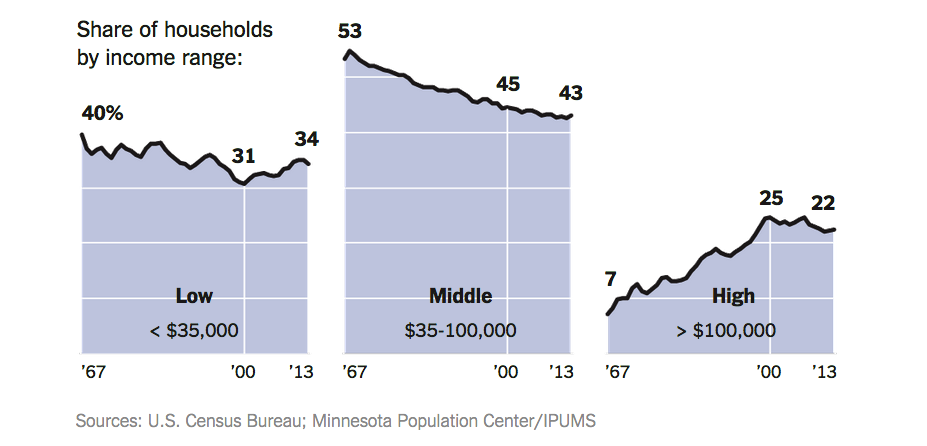Obama's middle-out economics is good. Bottom-up economics is better.
Inequality is hollowing out the middle of the economy, and we can't leave the bottom behind.


A free daily email with the biggest news stories of the day – and the best features from TheWeek.com
You are now subscribed
Your newsletter sign-up was successful
Lately, the Democrats have been trying to rebrand their political vision as "middle-out economics."
It’s certainly preferable to "upper-class economics" or "crazy-rich-fatcat" economics. And the basic argument for bulking up the middle class’ purchasing power over the long haul is sound.
But it also raises an uncomfortable, if obvious question: What about the lower class?
The Week
Escape your echo chamber. Get the facts behind the news, plus analysis from multiple perspectives.

Sign up for The Week's Free Newsletters
From our morning news briefing to a weekly Good News Newsletter, get the best of The Week delivered directly to your inbox.
From our morning news briefing to a weekly Good News Newsletter, get the best of The Week delivered directly to your inbox.
Poverty, when properly measured, has fallen over the last 50 years — thanks overwhelmingly to safety net spending — but still remains at around 16 percent. That includes 13 million children, and the U.S. has a shockingly high number of kids living below 50 percent of median income compared to other advanced countries. Meanwhile, the number of job seekers still outstrips the number of job openings in nearly every sector of the economy, and unemployment among the less educated remains much higher than for the country as a whole.
Yet the Democrats’ new proposals to boost the middle class feature a number of design aspects that render them almost useless to the lower class. More broadly, the Democrats have spent the last few decades turning away from a commitment to a broad and generous social safety net, and towards shrinking government and mandating work requirements. (Though ObamaCare was a welcome exception to this trend.)
The GOP is even worse on this score, eagerly pursuing even more cuts to the safety net and even more work requirements. It has also perpetuated our country’s strange habit of funneling aid through the tax code — and thus disproportionately benefiting the already well-off.
A report by The New York Times earlier this week laid out the problem starkly. From 1967 to 2000, the middle class — which the article defined as households making $35,000 to $100,000 in today's dollars — shrank by 8 percentage points, while the number of households making less shrank by 9 percentage points. But those households making more increased by 18 percentage points.
A free daily email with the biggest news stories of the day – and the best features from TheWeek.com

Conservative commentators took this as a good sign (more people making high incomes!), but it also suggests that moving from the middle to the upper class has been a lot easier than moving from the lower to the middle. Even more disturbing, the shrinkage of the lower class and the growth of the upper class both dramatically reversed after 2000 — each by 3 percentage points — while the middle continued to fall. The report also found that an increasing share of the middle is made up of older Americans — suggesting things would be even worse without Medicare and Social Security — while the poorly educated and single-parent homes are a rising share of the lower slice.
Then layer on the fact that the children of poor families are overwhelmingly likely to remain poor, and rich children to remain rich — even in those rare circumstances when the rich child did not get a college education and the poor child did. Class is pretty entrenched across generations in America.
We can add other data points to this. The share of consumption in the economy provided by the top 20 percent of earners has increased from 53.4 percent in 1992, to 61 percent in 2012. That same slice of the population has provided 90 percent of the increase in consumption since 2009. High-end goods and services are on the upswing, while retailers aimed at the middle class — like Sears and J.C. Penny — are retrenching.
As William Spriggs, a former Department of Labor economist, told Seth Michaels at Talking Points Memo, this shift comes with all sorts of terrible consequences for where job growth occurs and who gets access to it. As industries chase richer consumers, price points rise, and those employers become less able to offer jobs at middle-class wages. The jobs left are disproportionately in the service industry — attending to the upper class’ luxury consumption — with low wages and little chance of upward mobility.
As Michaels noted, modern corporations, with their fixation on shareholder value, don’t bother pushing back at this trend — they just adjust their business models accordingly. And political science suggests its the preferences and concerns of the upper class that utterly dominate politicians’ thinking. As long as the well-off are doing alright, neither our economic system nor our political system is inclined to worry about anyone else.
So the upper class isn’t just growing — it’s sucking up the entire economy with it, and leaving everyone else behind.
The argument for middle-out economics is that job growth is a feedback loop between consumers on one end and investors and businesses on the other. So increasing the middle’s purchasing power increases the inherent potential for job growth. But this applies in spades to the poor and the lower class. They’re even more cash-constrained than the middle class, and thus even more likely to go out and immediately spend any extra dollar in market income or government aid given to them.
When conservatives look at areas of endemic poverty, like Appalachia, they think they see a collapse in the social fabric and bourgeois values, with an attendant rise in dependence on government aid. But what they’re actually seeing is a catastrophic collapse in the economic feedback loop; one that government is too limited and unimaginative to counteract. Access to jobs and market incomes in these communities becomes increasingly scarce, as the lower class is essentially squeezed out of the economic ecology entirely.
So what we really need is bottom-up economics: a sustained effort to move purchasing power to both the middle and the lower class, and to ensure a baseline supply of good jobs even at the lowest end of the income ladder.
This will be expensive. And our political system appears terrified of even slight tax hikes on the upper class. But the threat of the long-term debt has been wildly over-hyped, and if ever there was a national priority that justified some serious borrowing in the short-to-medium term this is it.
And in the long term, if we successfully rebuild the lower class, the upper class may well become more tolerant of the tax revenues needed to sustain the system. If you lift up the bottom, people will be less afraid of falling from the top.
Jeff Spross was the economics and business correspondent at TheWeek.com. He was previously a reporter at ThinkProgress.
-
 The ‘ravenous’ demand for Cornish minerals
The ‘ravenous’ demand for Cornish mineralsUnder the Radar Growing need for critical minerals to power tech has intensified ‘appetite’ for lithium, which could be a ‘huge boon’ for local economy
-
 Why are election experts taking Trump’s midterm threats seriously?
Why are election experts taking Trump’s midterm threats seriously?IN THE SPOTLIGHT As the president muses about polling place deployments and a centralized electoral system aimed at one-party control, lawmakers are taking this administration at its word
-
 ‘Restaurateurs have become millionaires’
‘Restaurateurs have become millionaires’Instant Opinion Opinion, comment and editorials of the day
-
 The billionaires’ wealth tax: a catastrophe for California?
The billionaires’ wealth tax: a catastrophe for California?Talking Point Peter Thiel and Larry Page preparing to change state residency
-
 Bari Weiss’ ‘60 Minutes’ scandal is about more than one report
Bari Weiss’ ‘60 Minutes’ scandal is about more than one reportIN THE SPOTLIGHT By blocking an approved segment on a controversial prison holding US deportees in El Salvador, the editor-in-chief of CBS News has become the main story
-
 Has Zohran Mamdani shown the Democrats how to win again?
Has Zohran Mamdani shown the Democrats how to win again?Today’s Big Question New York City mayoral election touted as victory for left-wing populists but moderate centrist wins elsewhere present more complex path for Democratic Party
-
 Millions turn out for anti-Trump ‘No Kings’ rallies
Millions turn out for anti-Trump ‘No Kings’ ralliesSpeed Read An estimated 7 million people participated, 2 million more than at the first ‘No Kings’ protest in June
-
 Ghislaine Maxwell: angling for a Trump pardon
Ghislaine Maxwell: angling for a Trump pardonTalking Point Convicted sex trafficker's testimony could shed new light on president's links to Jeffrey Epstein
-
 The last words and final moments of 40 presidents
The last words and final moments of 40 presidentsThe Explainer Some are eloquent quotes worthy of the holders of the highest office in the nation, and others... aren't
-
 The JFK files: the truth at last?
The JFK files: the truth at last?In The Spotlight More than 64,000 previously classified documents relating the 1963 assassination of John F. Kennedy have been released by the Trump administration
-
 'Seriously, not literally': how should the world take Donald Trump?
'Seriously, not literally': how should the world take Donald Trump?Today's big question White House rhetoric and reality look likely to become increasingly blurred
